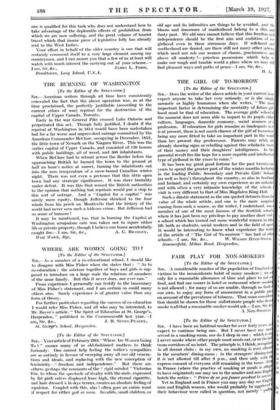THE GIRL OF TO-MORROW
[To the Editor of the SPECTATOR.] Sia,—Does the writer of the above article in your curreilt expect anyone to take her very seriously, or is she simply sarcastic or highly humorous when she writes, " The moil important factor in determining the mentality of future girl- hood must be that of education. The average girls' school of the moment does not seem able to impart to its pupils either culture, languages, domestic economy, social acumen or a profession. If education for girls remains as inadequate as it is at present, there is not much chance of the girl of to-morrow being any more fitted to take an important part in the world than her present day predecessor. Parents may rebel, are already showing signs or rebelling against this scholastic waste of their money and their daughters' intelligences. In this parental revolt lies the hope for a more capable and intellectual type of girlhood in the years to conic."
It has been my great good fortune for the past twenty-one years to spend the greater part of the winter months lecturing in the leading Public, Secondary and Private Girls' School (as well as boys') throughout the country, as also in Scotlat and Ireland, and certainly my own experience as an onlookc and with often a very intimate knowledge of the schools visit is very different to that of Miss Magdalen King-Hall.
Such a drastic statement as the one quoted detracts from th value of the whole article, and one is the more surpri coming from such a source, as the writer, I understand, was member of one of the most famous of the Scottish school where it has just been my privilege to pay another short visit a school which has turned out some wonderful women in afte life both as students, social workers and in the field of sport It would be interesting to know what experience the write of the article of " The Girl of To-morrow " has had of othe schools.—I am, Sir, &c., W. Wnsos HIND-Sin-1m Summerfield, Milton Road, Ilarpenden.






























































 Previous page
Previous page